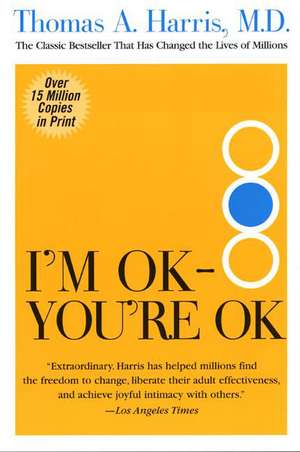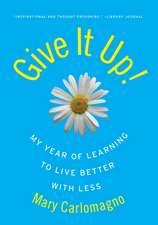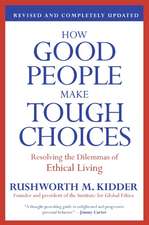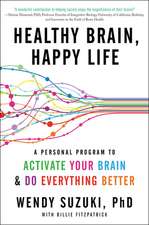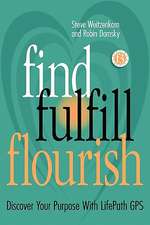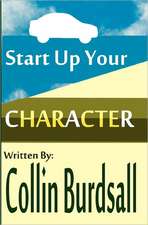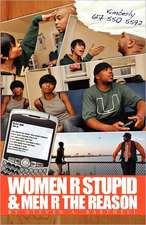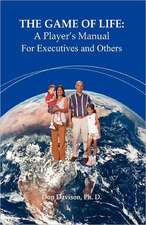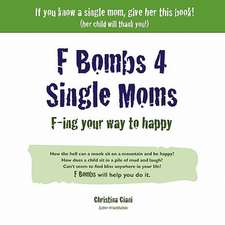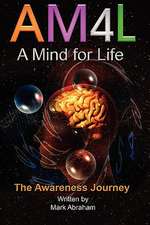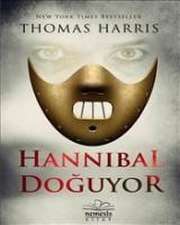I'm OK--You're OK
Autor Thomas Harrisen Limba Engleză Paperback – 5 iul 2004
"Extraordinary. Harris has helped millions find the freedom to change, liberate their adult effectiveness, and achieve joyful intimacy with others." —Los Angeles Times
Transactional analysis delineates three ego-states (Parent, Adult and Child) as the basis for the content and quality of interpersonal communication. “Happy childhood” notwithstanding, says Harris, most of us are living out the not OK feelings of a defenseless child wholly dependent on others (parents) for stroking and caring. At some stage early in our lives we adopt a “position” about ourselves and others that determines how we feel about everything we do. And for a huge portion of the population, that position is "I’m Not OK-You’re OK." This negative "life position," shared by successful and unsuccessful people alike, contaminates our rational adult capabilities, leaving us vulnerable to inappropriate, emotional reactions of our child and uncritically learned behavior programmed into our parent. By exploring the structure of our personalities and understanding old decisions, Harris believes we can find the freedom to change our lives.
Preț: 101.40 lei
Nou
Puncte Express: 152
Preț estimativ în valută:
19.40€ • 20.14$ • 16.18£
19.40€ • 20.14$ • 16.18£
Carte disponibilă
Livrare economică 01-15 martie
Livrare express 15-21 februarie pentru 46.27 lei
Preluare comenzi: 021 569.72.76
Specificații
ISBN-13: 9780060724276
ISBN-10: 0060724277
Pagini: 320
Dimensiuni: 135 x 203 x 18 mm
Greutate: 0.25 kg
Ediția:Quill
Editura: HarperCollins Publishers
Colecția HarperPerennial
ISBN-10: 0060724277
Pagini: 320
Dimensiuni: 135 x 203 x 18 mm
Greutate: 0.25 kg
Ediția:Quill
Editura: HarperCollins Publishers
Colecția HarperPerennial
Textul de pe ultima copertă
Transactional Analysis delineates three observable ego-states (Parent, Adult, and Child) as the basis for the content and quality of interpersonal communication. "Happy childhood" notwithstanding, says Harris, most of us are living out the Not ok feelings of a defenseless child, dependent on ok others (parents) for stroking and caring. At some stage early in our lives we adopt a "position" about ourselves and others that determines how we feel about everything we do. And for a huge portion of the population, that position is "I'm Not OK -- You're OK." This negative "life position," shared by successful and unsuccessful people alike, contaminates our rational Adult capabilities, leaving us vulnerable to inappropriate emotional reactions of our Child and uncritically learned behavior programmed into our Parent. By exploring the structure of our personalities and understanding old decisions, Harris believes we can find the freedom to change our lives.
Recenzii
“It’s easy to relate to I’m OK-You’re OK. Again and again the reader will find his own predicament staring up at him from the page, along with its message, “If you don’t like the trap, you can change it.” — Cleveland Press
“Harris has stripped away the technical language of psychoanalysis and presented with lucid logic a way to self-understanding and change.” — Los Angeles Times
“The book reads easily and interestingly for the unlettered in behavior science…. The practicing therapist cannot help but benefit immeasurably, especially if his inclinations are toward family or group therapy.” — Choice
“[Readers] who roam these optimistic pages with their allusions to and discussions of Freud, Wilder Penfield, Elton Trueblood, Eric Berne, Bishop Pike, Teilhard de Chardin, and many other great and not-so-great experts may well make the book a bestseller.” — Library Journal
“Harris has stripped away the technical language of psychoanalysis and presented with lucid logic a way to self-understanding and change.” — Los Angeles Times
“The book reads easily and interestingly for the unlettered in behavior science…. The practicing therapist cannot help but benefit immeasurably, especially if his inclinations are toward family or group therapy.” — Choice
“[Readers] who roam these optimistic pages with their allusions to and discussions of Freud, Wilder Penfield, Elton Trueblood, Eric Berne, Bishop Pike, Teilhard de Chardin, and many other great and not-so-great experts may well make the book a bestseller.” — Library Journal
Notă biografică
The late Thomas Harris was a Navy psychiatrist and a professor at the University of Arkansas. He practiced psychiatry in Sacramento, California and directed the Transactional Analysis Association.
